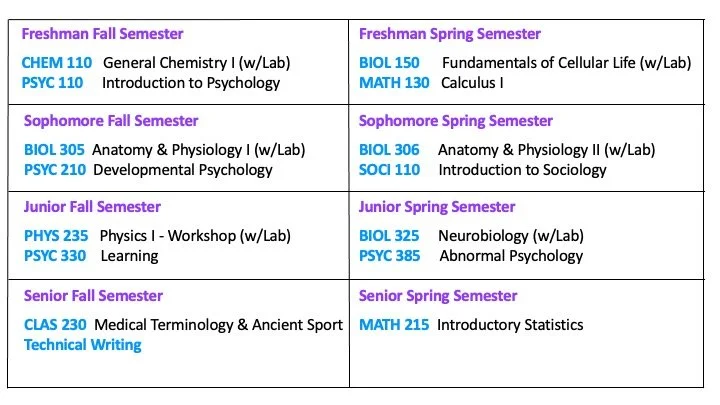Occupational Therapist
OCCUPATIONAL THERAPIST (OT)
Occupational therapists (OTs) help people across the lifespan participate in the things they want and need to do through the therapeutic use of everyday activities.
Admission requirements for Occupational Therapist programs vary from one program to another. However, most programs share a group of prerequisite courses, and the Hendrix courses that fulfill these requirements are listed below.
In addition, many schools require time spent observing, shadowing, or interning with a occupational therapist. A Hendrix internship is an excellent way to get 120 of these hours, and volunteering or working at a clinic can also help you build up this part of your resume.
Common Course Requirements for OT Programs+
BIOL 305/306 Anatomy & Physiology I & II (w/Lab)
BIOL 325 Neurobiology (w/Lab)*
*Note: BIOL 150 Fundamentals of Cellular Life is a prerequisite for this course
CLAS 230 Medical Terminology & Ancient Sport
MATH 215 Introductory Statistics
PHYS 235 General Physics I (Workshop)*
*Note: MATH 130 Calculus I is a pre- or corequisite for PHYS 235
PSYC 220 Developmental Psychology
PSYC 385 Abnormal Psychology (some programs)*
*Note: there is a Psychology (PSYC) prerequisite for this course
One Sociology (SOCI) OR Anthropology (ANTH) course
Other Frequently Required Courses+
Technical Writing 300-level - only required by the University of Arkansas OT Program
+Note: A grade of C or better in all prerequisite coursework is required for acceptance into most programs.
Arkansas has four OT Programs
University of Central Arkansas - click here for more info
University of Arkansas & University of Arkansas for Medical Sciences - click here for more info
Arkansas State University - click here for more info
Arkansas Colleges of Health Education - click here for more info
How to Prepare for OT School
One possible course plan appears below.
Please note: This plan does not include all of the necessary courses to fulfill the First-Year Experience, Learning Domains, Capacities, Odyssey, or Major requirements. Students are strongly encouraged to work with their Academic Advisor to make sure all of the requirements for graduation are fulfilled, as well as the prerequisites for specific OT programs.
More information about OTs
OTs work to help people lead satisfying and independent lives. OT careers often involve working with individuals in their homes and examples include the following: helping people restore essential skills that may have been lost following an accident; aid disabled children in participating in social situations; assist individuals that are experiencing physical and possibly cognitive changes due to age.
Benefits of becoming an OT include the ability to practice in various settings, excellent job opportunities, flexibility and high job satisfaction.
According to the Bureau of Labor Statistics, the median salary for an OT in 2017 was $83,200.
Look to the Future
Because admission requirements for occupational therapist programs vary from one program to another, students should contact the program(s) of their choice early in their Hendrix career. It is your responsibility to contact each school you are applying to and get approval for any course you might wish to substitute for a program’s prerequisite. Also remember that Occupational Therapist is not a major at Hendrix.
Get involved!
Community service, health care experiences, and leadership activities are essential. You need lots of experience working with people for people. Be involved and serve on 1 to 2 Hendrix clubs or committees.
Observe Occupational Therapists
Many schools require time spent observing, shadowing or interning with an occupational therapist, and most admitted students will exceed the minimum requirements. Hendrix internships require a minimum of 120 hours. You should try to do more than 120 hours and with different OTs if possible.
Keep your academic record strong
Few individuals get admitted with only the minimal requirements, and most admitted students have GPAs of 3.2 or above. Programs are looking for the most highly qualified students and will therefore have higher expectations and standards. When choosing your schools to apply to, check to make sure you will meet or exceed the requirements.
Develop relationships
Get to know some health care providers, faculty and work/volunteer supervisors. All of these individuals can be a resource for you to obtain new and valuable opportunities. Always maintain a good rapport with these contacts as well. You never know when you will need a letter of recommendation, and you want to make sure they can provide you with a great letter, not a mediocre one.
Stay up to date on current healthcare issues
The American Occupational Therapy Association (AOTA) is a great resource for staying up-to-date on current issues impacting OTs. A list of OT programs can be found here: https://www.aota.org/education/find-a-school
For More Information:
Contact Richard Murray in the Biology Department.










